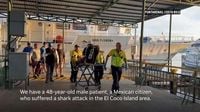On a remote stretch of the Pacific, some 340 miles off Costa Rica’s sun-drenched coast, a scientific expedition took an unexpected and harrowing turn last Saturday. Mauricio Hoyos, a renowned Mexican marine biologist, was seriously injured after being attacked by a shark while tagging the very creatures he’s devoted his life to studying and protecting. The incident, which unfolded near the famed Cocos Island, has sent ripples through the international marine research community and reignited conversations about the delicate balance between science and the wild unpredictability of nature.
According to Costa Rica’s Fire Department, the 48-year-old Hoyos was leading a research team as part of the One Ocean Worldwide Coalition, a collaborative network involving organizations like Fins Attached, For the Oceans Foundation, Reserva Tortuga, and the Rob Stewart Sharkwater Foundation. The group had been working off Cocos Island, a UNESCO World Heritage Site since 1997, which is celebrated globally for its extraordinary marine biodiversity—especially its thriving shark populations. The island’s remoteness, about 340 miles (or 550 kilometers) from the mainland, makes it a magnet for both scientists and adventure-seeking divers.
It was during a routine monitoring operation that the day’s tranquility shattered. Hoyos was tagging one of the island’s shark species for research purposes when, as reported by the Associated Press, the animal suddenly turned. Luis Fernández, a physician with the Costa Rican Fire Department, recounted the harrowing moment: “He was tagging species for monitoring and when he tagged one of the island’s shark species, the shark turned. It was about 4 meters long with an enormous bite force—it turned and bit him on the head.” The bite left Hoyos with serious injuries to his head, face, and arms.
The shark, identified by some reports as a Galapagos shark and estimated at roughly 13 feet in length, struck with little warning. Despite the severity of the attack, the response from both Hoyos’ team and Costa Rican emergency services was swift and decisive. The Fire Department coordinated a complex and lengthy rescue, carrying Hoyos on a 36-hour journey by boat and ambulance to a hospital in Costa Rica’s capital. By the time he arrived, he was in stable but serious condition—a testament to both his resilience and the skill of his rescuers.
Incidents like these are, by all accounts, extremely rare. Alex Antoniou, executive director of Fins Attached, emphasized this point on social media, stating, “Incidents like this are extremely rare. Dr. Hoyos is an extraordinary scientist who has dedicated his career to shark conservation, and we are deeply grateful for the support of the Cocos Island community in this very difficult time.” The sentiment was echoed by the For the Oceans Foundation, which praised the quick response of rescuers and underscored Hoyos’ instrumental role in advancing shark conservation research. They reaffirmed their dedication to ongoing work, inspired by Hoyos’ “dedication and resilience.”
Cocos Island itself has long been a focal point for marine biologists and conservationists. Declared a national park and UNESCO World Heritage Site in 1997, the island is often described as a living laboratory. Its waters are home to at least 14 species of sharks, including whale sharks, hammerhead sharks, and tiger sharks, according to Costa Rica’s Ministry of Environment and Energy. The area’s rich biodiversity draws both scientific expeditions and recreational divers from around the world, eager to catch a glimpse of these majestic creatures in their natural habitat.
Yet, as the 2017 incident involving a female tiger shark and a diver tragically demonstrated, the wildness that makes Cocos Island so alluring also carries inherent risks. That attack, which resulted in a fatality and serious injuries to a dive guide, was the first of its kind near the park. The rarity of such incidents, however, has done little to dampen the sense of awe and respect that researchers like Hoyos hold for these apex predators.
Hoyos himself is no stranger to the unpredictable nature of fieldwork. Widely regarded as one of the world’s leading shark experts, he has spent decades studying and advocating for the protection of these often-misunderstood animals. His work with the One Ocean Worldwide Coalition exemplifies the spirit of international collaboration that has become increasingly vital in the face of mounting threats to marine ecosystems. The coalition’s efforts span research, conservation, and public education, aiming to ensure that future generations will continue to marvel at the ocean’s wonders.
In the immediate aftermath of the attack, messages of support and concern poured in from colleagues and conservationists across the globe. The Cocos Island community, in particular, rallied to assist in the rescue and recovery, highlighting the close-knit bonds that often form among those who work in such remote and challenging environments. As Alex Antoniou put it, “We are deeply grateful for the support of the Cocos Island community in this very difficult time.”
For the Oceans Foundation, reflecting on the ordeal, noted that Hoyos has been “instrumental” in ongoing research and that his “dedication and resilience” serve as an inspiration to all involved in marine conservation. The organization affirmed its commitment to continuing its work, undeterred by the rare but sobering reminder of nature’s unpredictability.
While the physical scars from Saturday’s attack may take time to heal, those who know Hoyos expect that his passion for shark conservation will remain undiminished. The incident has also prompted renewed appreciation for the often-overlooked dangers faced by scientists working in the field. As research teams around the world push the boundaries of knowledge, they do so with a keen awareness that nature, in all its beauty and ferocity, remains ultimately untamed.
For now, the focus remains on Hoyos’ recovery and the ongoing mission to protect the ocean’s most iconic inhabitants. The story of his ordeal—equal parts cautionary tale and testament to human determination—serves as a vivid reminder of the risks and rewards inherent in the pursuit of scientific discovery. As the world watches and waits for updates on his condition, one thing is certain: the work of Mauricio Hoyos and his colleagues will continue to inspire, educate, and, hopefully, safeguard the marine world for years to come.


